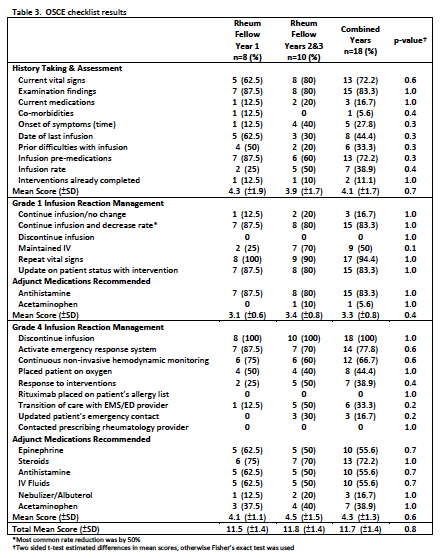Session Information
Date: Sunday, November 5, 2017
Title: Education
Session Type: ACR Concurrent Abstract Session
Session Time: 4:30PM-6:00PM
Background/Purpose:
Infusible DMARDs are commonly prescribed in rheumatology and other fields. There are no published formal educational curricula rheumatology fellowship programs can use to teach infusion reaction management skills to fellows. We aimed to better understand this educational gap, and implement and assess the effectiveness of an experiential curriculum on acute infusion reaction management.
Methods:
We included current rheumatology fellows and recent graduates from five fellowship programs. Using a novel behavioral checklist, we assessed fellowsÕ performance managing an infusion reaction in a simulation, followed by a didactic focused on infusion reactions. Pre and post-surveys assessed experiences to determine relevance, as well as attitudes and knowledge.
Results:
Despite ubiquitous prescribing of infusible biologic DMARDs, >50% of fellows were uncomfortable managing infusion reactions and 11% preferred prescribing injections because of these concerns. Only 11% of fellows reported infusion reaction training during fellowship, but 56% reported managing actual patient infusion reactions. Graduates reported similar experiences with 67% currently utilizing infusion services within their immediate clinic areas and 50% having managed actual patient infusion reactions. Furthermore, all graduates reported no specific training requirements prior to prescribing infusible DMARDs in their current practice. In the simulated infusion reaction, fellows managed grade 1 reactions appropriately, but grade 4 reactions poorly, meeting <50% of objectives. All fellows discontinued the infusion in the setting of anaphylaxis, but only 56% administered epinephrine. There was no difference in performance or written knowledge by training year. All fellows felt more prepared to manage infusion reactions post-curriculum and were satisfied with the experience. All graduates recommended fellows receive education on this topic.
Conclusion:
We confirmed an education gap in rheumatology fellowship training regarding infusion reactions, both in knowledge and performance. We developed and implemented a brief experiential curriculum including simulation of a high-risk patient care scenario. This curriculum was well received and is easily exportable to other programs and fields of medicine.
To cite this abstract in AMA style:
Weiner J, Eudy AM, Criscione-Schreiber L. How Well Do Rheumatology Fellows Manage Acute Infusion Reactions? a Pilot Curricular Intervention [abstract]. Arthritis Rheumatol. 2017; 69 (suppl 10). https://acrabstracts.org/abstract/how-well-do-rheumatology-fellows-manage-acute-infusion-reactions-a-pilot-curricular-intervention/. Accessed .« Back to 2017 ACR/ARHP Annual Meeting
ACR Meeting Abstracts - https://acrabstracts.org/abstract/how-well-do-rheumatology-fellows-manage-acute-infusion-reactions-a-pilot-curricular-intervention/



